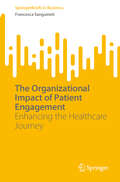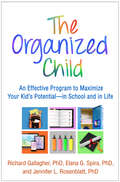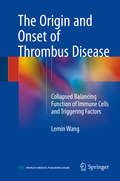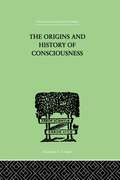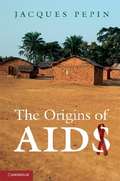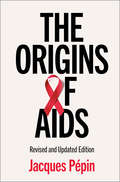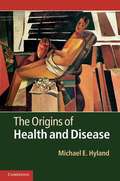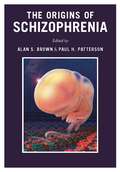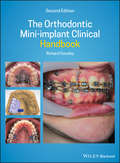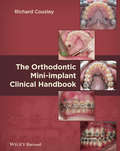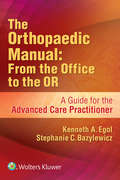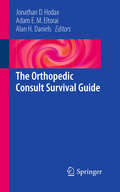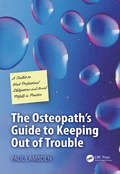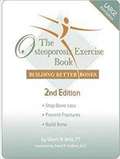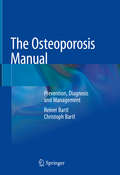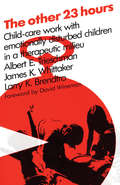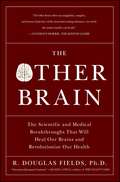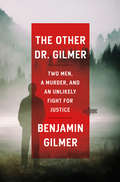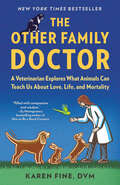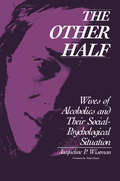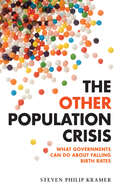- Table View
- List View
The Organizational Impact of Patient Engagement: Enhancing the Healthcare Journey (SpringerBriefs in Business)
by Francesca SanguinetiThis book examines the transformative power of patient engagement in revolutionizing healthcare organizational efficiency. It expresses a need for a more patient-centered approach in healthcare delivery to improve patient outcomes and organizational workflows. Using Fondazione IRCCS Istituto Neurologico Nazionale Mondino (Italy) as a case study, the author offers a framework for improving patient interactions from the initial point of contact, namely front office operations, and proposes strategies for healthcare organizations across the globe based on best practices and lessons learned while also emphasizing the importance of continuous adaptation and improvement. Grounded in the latest academic research, this book provides students, practitioners, professionals, and scholars in healthcare administration and management with a theoretical foundation for patient engagement with practical applications to lead and innovate in the modern healthcare management system.
The Organized Child: An Effective Program to Maximize Your Kid's Potential--in School and in Life
by Richard Gallagher Elana G. Spira Jennifer L. RosenblattAre you sick of nagging your child to write down homework assignments? Is his or her backpack a black hole that eats up papers, books, and gym clothes? Organizational skills problems aren't just frustrating--they get in the way of school success and wreak havoc at home. Fortunately, help is at hand. This unique resource stands out from other books because it is based on a scientifically tested program that works. Learn how you can teach your 7- to 13-year-old specific skills to: *Organize school materials and toys. *Track assignments. *Improve time management and planning. *Overcome brain "Glitches"--mischievous creatures that trip kids up. *Create and follow effective routines. Concrete examples, tips for strategically using praise and rewards, and practical tools (you can download and print additional copies as needed) help you implement each step of the program. Maximizing your kid's potential starts now--here's how. Mental health professionals, see also the related intervention manual from Gallagher et al., Organizational Skills Training for Children with ADHD: An Empirically Supported Treatment.
The Origin and Onset of Thrombus Disease: Collapsed Balancing Function Of Immune Cells And Triggering Factors
by Lemin WangThis book analyzes the internal and external causes of acquired and familiar venous thrombosis and proposes the origins and onset of venous thrombus diseases and their triggering factors. It discusses venous and arterial thrombus in two parts, each starting from the genomics and the findings of immunocytological research conducted in a variety of clinical groups and on different experimental models and revealing the mechanisms behind the development of thrombotic diseases and the pathogenesis processes. Further, the book describes the clinical manifestation and the nature of the diseases. The book offers valuable insights important in the prevention and treatment of thrombotic disease.
The Origin of a New Progenitor Stem Cell Group in Human Development: An Immunohistochemical-, Light- And Electronmicroscopical Analysis (Advances In Anatomy, Embryology And Cell Biology Ser. #230)
by Hubert Wartenberg Andreas Miething Kjeld MøllgårdThis book presents an overview of a new group of progenitor stem cells. Their origins were originally detected in light- and electron microscopical sections of plastic embedded human embryonal and fetal organs. The distribution of these cells can result in a large quantity of ectopic stem cells. The observation of these ectopic stem cells leads us to postulate the existence of a basic wave of stem cell progenitors. This process proceeds earlier and independently from germ cell migration. This first wave of progenitor stem cell migration initially reaches the peri-aortal AMG-region (Aortal-Mesonephric-Gonadal region). From here, some of these progenitor cells enter the aorta, are distributed through the vascular system and become the embryonal stem cells (reserve cells) in many peripheral tissues. A second part delivers progenitor cells for the adrenal 'anlage'. Within the peripheral Zona definitiva of the adrenal cortex the progenitor cells multiplicate and subsequently leave the adrenal cortex through a gate of the capsule. The progenitor cells arrive at the pre-aortal sympathic plexus ('second brain'). Within the plexus ganglia they form new organ-like clusters, the paraganglia. In a second process the progenitor cells (Chromaffine cells) enter sympathetic nerve bundles. Here an 'axonal migration' starts, which guides the progenitor cells to several peripheral organs. During this migration process the stem cells develop into their final state. In the adrenal cortex the ingrowing nerves guide the stem cells to the adrenal medulla. In the pancreas the ingrowing nerve fibers guide the stem cells to the islets. These newly detected stem cells represent a specific developmental step which is found only in humans.
The Origins And History Of Consciousness (Bollingen Ser. #Vol. 42)
by Neumann, ErichFirst Published in 1999. Routledge is an imprint of Taylor & Francis, an informa company.
The Origins Of Love And Hate (Key Texts In The Psychology Of Health And Illness)
by Suttie, Ian DFirst published in 1999. Routledge is an imprint of Taylor & Francis, an informa company.
The Origins of AIDS
by Jacques PepinIt is now thirty years since the discovery of AIDS but its origins continue to puzzle doctors and scientists. Inspired by his own experiences working as an infectious diseases physician in Africa, Jacques Pepin looks back to the early twentieth-century events in Africa that triggered the emergence of HIV/AIDS and traces its subsequent development into the most dramatic and destructive epidemic of modern times. He shows how the disease was first transmitted from chimpanzees to man and then how urbanization, prostitution, and large-scale colonial medical campaigns intended to eradicate tropical diseases combined to disastrous effect to fuel the spread of the virus from its origins in Léopoldville to the rest of Africa, the Caribbean and ultimately worldwide. This is an essential new perspective on HIV/AIDS and on the lessons that must be learnt if we are to avoid provoking another pandemic in the future.
The Origins of AIDS
by Jacques PépinIt is now forty years since the discovery of AIDS, but its origins continue to puzzle doctors, scientists and patients. Inspired by his own experiences working as a physician in a bush hospital of Zaire, Jacques Pépin looks back to the early twentieth-century events in central Africa that triggered the emergence of HIV/AIDS and traces its subsequent development into the most dramatic and destructive epidemic of modern times. He shows how the disease was first transmitted from chimpanzees to man and then how military interventions, urbanisation, prostitution and large-scale colonial medical campaigns intended to eradicate tropical diseases combined to disastrous effect to fuel the spread of the virus from its origins in Léopoldville to the rest of Africa, the Caribbean and ultimately worldwide. This is an essential perspective on HIV/AIDS and on the lessons that must be learned as the world faces another pandemic.
The Origins of COVID-19: China and Global Capitalism
by Li ZhangA new strain of coronavirus emerged sometime in November 2019, and within weeks a cluster of patients began to be admitted to hospitals in Wuhan with severe pneumonia, most of them linked to the Huanan Seafood Wholesale Market. China's seemingly effective containment of the first stage of the epidemic, in glaring contrast with the uncontrolled spread in Europe and the United States, was heralded as a testament to the Chinese Communist Party's unparalleled command over the biomedical sciences, population, and economy. Conversely, much academic and public debate about the origins of the virus focuses on the supposedly "backwards" cultural practice of consuming wild animals and the perceived problem of authoritarianism suppressing information about the outbreak until it was too late. The Origins of COVID-19, by Li Zhang, shifts debate away from narrow cultural, political, or biomedical frameworks, emphasizing that we must understand the origins of emerging diseases with pandemic potential (such as SARS and COVID-19) in the more complex and structural entanglements of state-making, science and technology, and global capitalism. She argues that both narratives, that of China's victory and the racist depictions of its culpability, do not address—and even aggravate—these larger forces that degrade the environment and increase the human-wildlife interface through which novel pathogens spill over into humans and may rapidly expand into global pandemics.
The Origins of Health and Disease
by Michael E. HylandSome phenomena in medicine and psychology remain unexplained by current theory. Chronic fatigue syndrome, repetitive strain injury and irritable bowel syndrome, for example, are all diseases or syndromes that cannot be explained in terms of a physiological abnormality. In this intriguing book, Michael E. Hyland proposes that there is a currently unrecognised type of illness which he calls 'dysregulatory disease'. Hyland shows how such diseases develop and how the communication and art of medicine, good nursing care, complementary medicine and psychotherapy can all act to reduce the dysregulation that leads to dysregulatory disease. The Origins of Health and Disease is a fascinating book that develops a novel theory for understanding health and disease, and demonstrates how this theory is supported by existing data, and how it explains currently unexplained phenomena. Hyland also shows how his theory leads to new testable predictions that, in turn, will lead to further scientific advancement and development.
The Origins of Schizophrenia
by Alan Brown Paul PattersonThe Origins of Schizophrenia synthesizes key findings on a devastating mental disorder that has been increasingly studied over the past decade. Advances in epidemiology, translational neuroscience technology, and molecular and statistical genetics have recast schizophrenia's neurobiological nature, identifying new putative environmental risk factors and candidate susceptibility genes. Providing the latest clinical and neuroscience research developments in a comprehensive volume, this collection by world-renowned investigators answers a pressing need for balanced, thorough information, while pointing to future directions in research and interdisciplinary collaboration.The book, featuring a foreword by Robert Freedman, M.D., thoroughly examines these topics from the vantage points of epidemiologic, clinical, and basic neuroscience approaches, making it an essential resource for researchers in psychiatry, psychology, and neuroscience and for clinical mental health professionals.
The Orthodontic Mini-implant Clinical Handbook
by Richard CousleyOffers the very latest on the theory and practice of integrating mini-implant techniques into clinical practice This all-new second edition of The Orthodontic Mini-implant Clinical Handbook provides a thoroughly revised and expanded update to the theoretical and practical aspects of using mini-implants in orthodontic practice. Taking a practical step-by-step approach with hundreds of clinical images, it presents updated clinical techniques and new clinical cases, covering all topics of importance for utilising mini-implants. It also includes a new chapter on mini-implant anchored maxillary expansion appliances. It begins with a chapter that looks at mini-implant principles and potential complications, before moving onto clinical and design factors for maximising mini-implant success. Other chapters cover incisor retraction; molar distalisation and protraction; intrusion and anterior openbite treatments; bone anchored rapid maxillary expansion; orthognathic surgical uses; and ectopic teeth. Provides a comprehensive guide to both theoretical and practical advice for the use of mini-implants in orthodontic practice Covers updated clinical techniques and new clinical cases Presents a new chapter on mini-implant anchored maxillary expansion appliances Takes a highly illustrated step-by-step approach ideal for clinical practice The Orthodontic Mini-Implant Clinical Handbook is an essential resource to orthodontists, maxillofacial surgeons, practicing dentists, and anyone with an interest in mini-implant skeletal anchorage.
The Orthodontic Mini-implant Clinical Handbook
by Richard CousleyThe Orthodontic Mini-Implant Clinical Handbook is the must-have book for trainee and practicing orthodontists. It provides the essential theoretical and clinical mini-implant information to enable the clinician to easily introduce skeletal anchorage into their practice across a wide variety of common clinical scenarios. The initial chapters cover general principles with subsequent chapters employing a step-by-step approach to guide the novice through the most common clinical uses for orthodontic mini-implants including: incisor retraction, molar distalisation, transverse and asymmetry corrections, and orthognathic surgery uses.
The Orthopaedic Manual: From The Office To The Or
by Kenneth EgolFrom the office to the operating room to the emergency department, this practical, pocket-sized guide is an essential guide for advanced practice providers of orthopaedic care. Filling an important resource gap for the orthopaedic team, this manual focuses on the aspects of musculoskeletal care that an advanced care practitioner will commonly provide in daily practice. It clearly covers the specific skills and knowledge that enable physician assistants and nurse practitioners to provide high-quality, cost-effective care, with the goal of restoring each patient to maximum functional capacity and quality of life.
The Orthopedic Consult Survival Guide
by Adam E. M. Eltorai Alan H. Daniels Jonathan D. HodaxThis is a quick-reference resource covering the most common acute orthopedic injuries. Including bulleted text and easy-to-follow algorithms, protocols, and images, this "pocket consultant" provides the most up-to-date information when you need it most. Organized anatomically for fast reference, each chapter is broken down into the most common and most serious injuries with tips on how to evaluate and treat adult and pediatric patients. Each injury pattern discussed includes a brief description covering what to ask, what to bring, what to request, what to test, what to look for, and how to further evaluate. The contributing authors are senior orthopedic surgery residents at a major Level-1 Trauma Center who have experience managing a high volume of orthopedic injuries and who have trained many young residents. Covering all aspects of acute care, The Orthopedic Consult Survival Guide is an indispensable tool for medical students, residents, fellows, attendings , and affiliated providers in orthopedic surgery, emergency medicine, and surgery caring for orthopedic patients in emergency rooms, urgent care centers, and primary practice settings.
The Osteopath's Guide to Keeping Out of Trouble: A Toolkit to Meet Professional Obligations and Avoid Pitfalls in Practice
by Paul LambdenThis updated edition of a standard text for general practitioners includes topics such as how pay is determined, cash flow, business planning, bookkeeping, insurance and VAT. It also contains guidance on tax and self-assessment.
The Osteoporosis Exercise Book: Building Better Bones
by David R. GelbartThe Osteoporosis Exercise Book, 2nd Edition by Sherri R. Betz, PT, GCS, CEEAA, was written to help you incorporate safe mat, chair and standing exercises into your bone-building program. The exercises will help you build bone density of the spine and hip, improve posture and balance, and increase flexibility and mobility. <p><p> You will also learn how to avoid movements that increase the risk of fracture. Includes photos, nutritional recommendations, and some of the latest research findings on Osteoporosis. Large print, special "stay open" binding and over 100 photos!
The Osteoporosis Manual: Prevention, Diagnosis and Management
by Reiner Bartl Christoph BartlThis comprehensive manual covers all aspects of the prevention, diagnosis and management of osteoporosis, offering an upbeat and optimistic assessment of what can be achieved. While scientifically based, the book provides easy-to-follow guidelines for lifelong maintenance of skeletal structure and function. It deals with everything from the basic physiology of bone and mineral metabolism to the diagnostic utility of radiologic imaging and specialized tests and current treatment recommendations, including for fracture management. The relationship of osteoporosis to a variety of other disorders is also thoroughly explored and elucidated. Osteoporosis represents a global threat because every human being is vulnerable to it as time passes. The authors point out the enormous scale of the problem in terms of the human suffering, morbidity, and mortality on the one hand and the associated astronomical national and global costs on the other. Osteoporosis is preventable, and every doctor in every medical discipline can contribute to this goal. And though prevention is better than cure, it is never too late for effective therapy, as outlined in this book.Bone is every doctorʼs and every bodyʼs business!
The Other 23 Hours: Child Care Work with Emotionally Disturbed Children in a Therapeutic Milieu (Modern Applications Of Social Work Ser.)
by Larry BrendtroAmong other revolutionary developments of today's world is the so-called "knowledge explosion". So much is being written so fast about so many things that it is becoming well-nigh ir--retrievable. One consequently can never be sure that he knows what there is to know about many kinds of phenomena or types of problems existing in the modern world due to the chance that something exists in written form that simply cannot be found, so bulky is the load of literature. The common idea that only the sick child, and never the well, needs special emotional supports and helps from the adult is simply an error. For the well child is not immune from pile-ups of severe emotional intensity when overwhelmed by confusion and conflicts from within. Certainly, the normal kid can be ex--pected to handle such crises either from within or without better than his sick peer on the average, but that does not mean always; and the critical issue for the well child is: is he ready at the time they hit? If not, he needs, quite unmistakably, emotional first aid from the adult - parent, teacher, camp counsellor (or what have you) - who is in charge of his life at that moment. The reader will find that what the authors describe in The Other 23 Hours as the everyday requirement diet, as far as child handling is concerned for their disturbed children, is transferable to the normal crises of normal child--hood.
The Other Brain: From Dementia to Schizophrenia, How New Discoveries about the Brain Are Revolutionizing Medicine and Science
by R. Douglas FieldsDespite everything that has been written about the brain, a potentially critical part of this vital organ has been overlooked—until now. The Other Brain examines the growing importance of glia, which make up approximately 85 percent of the cells in the brain, and the role they play in how the brain functions, malfunctions, and heals itself. Long neglected as little more than cerebral packing material, glia (meaning “glue”) are now known to regulate the flow of information between neurons and to repair the brain and spinal cord after injury and stroke. But scientists are also discovering that diseased and damaged glia play a significant role in psychiatric illnesses such as schizophrenia and depression, and in neurodegenerative diseases such as Parkinson’s and Alzheimer’s. Diseased glia cause brain cancer and multiple sclerosis and are linked to infectious diseases such as HIV and prion disease (mad cow disease, for example) and to chronic pain. The more we learn about these cells that make up the “other” brain, the more important they seem to be. Written by a neuroscientist who is a leader in glial research, The Other Brain gives readers a much more complete understanding of how the brain works and an intriguing look at potentially revolutionary developments in brain science and medicine.
The Other Dr. Gilmer: Two Men, a Murder, and an Unlikely Fight for Justice
by Benjamin GilmerA powerful true story about a shocking crime and a mysterious illness that will forever change your notions of how we punish and how we heal—an expansion on one of the most popular This American Life episodes of all time&“A remarkable medical detective story–cum–memoir, grippingly told . . . I was drawn in by every part of it.&”—Atul Gawande, #1 New York Times bestselling author of Being MortalFresh out of medical residency, Dr. Benjamin Gilmer joined a rural North Carolina clinic only to find that its previous doctor shared his last name. Dr. Vince Gilmer was loved and respected by the community—right up until he strangled his ailing father and then returned to the clinic for a regular week of work. Vince&’s eventual arrest for murder shocked his patients. How could their beloved doctor be capable of such violence? The deeper Benjamin looked into Vince&’s case, the more he became obsessed with discovering what pushed a good man toward darkness. When Benjamin visited Vince in prison, he met a man who appeared to be fighting his own mind, constantly twitching and veering into nonsensical tangents. Sentenced to life in prison, Vince had been branded a cold-blooded killer and a &“malingerer&”—a person who fakes an illness. But it was obvious to Benjamin that Vince needed help. Alongside This American Life journalist Sarah Koenig, Benjamin resolved to understand what had happened to his predecessor. Time and again, the pair came up against a prison system that cared little about the mental health of its inmates—despite more than a third of them suffering from mental illness. The Other Dr. Gilmer takes readers on a riveting and heart-wrenching journey through our shared human fallibility, made worse by a prison system that is failing our most vulnerable citizens. With deep compassion and an even deeper sense of justice, Dr. Benjamin Gilmer delves into the mystery of what could make a caring doctor commit a brutal murder. And in the process, his powerful story asks us to answer a profound question: In a country with the highest incarceration rates in the world, what would it look like if we prioritized healing rather than punishment?
The Other End of the Stethoscope
by Marcus EngelWork overload Constantly changing policies Increasing bureaucratic regulations These are just a few of the challenges health care providers face everyday; Challenges that limit the ability to provide excellent patient care. After being blinded and suffering catastrophic injuries at the hands of a drunk driver, Marcus Engel witnessed health care from the other end of the stethoscope. Through 300 hours of reconstructive facial surgery, and years of hospitalization, rehab and recovery, Marcus witnessed first hand, the good, the bad and the ugly of patient care. Marcus' insights will give health care providers new and essential strategies to rediscover the magic and compassion between caregiver and patient. "With over 20 years of experience in medical education, I wish I had this book to share with every resident I taught. Marcus has cut right to the chase, and provides a perspective on medical care that every physician, nurse, and allied health professional should hear." David Campbell, MD, MEd President/CEO Institute for Family Medicine "Marcus' book is a powerful reminder of why we do what we do, and how the tools of communication, compassion and caring make all the difference." Terri Seidel, RN Director of Operations St. Louis and Southern Illinois region Healthsouth Surgery Centers.
The Other Family Doctor: A Veterinarian Explores What Animals Can Teach Us About Love, Life, and Mortality
by Karen FineNEW YORK TIMES BESTSELLER • Calling all animal lovers! A heartwarming memoir about one woman's career as a vet and the unique role pets play in our lives • &“Filled with compassion and wisdom, Karen Fine is a healer whose own wounds have deepened her gifts for bringing animals and their people comfort and peace.&” —Sy Montgomery, bestselling author of The Soul of an Octopus A tribute to our furry, feathery, scaley, and wet family members, All Creatures Great and Small meets Being Mortal in this compelling memoir of one woman's dream to become a veterinarian.Karen Fine always knew that she wanted to be a vet and wasn't going to let anything stop her: not her allergy to cats, and not the fact that in the '80s veterinary medicine was still a mostly male profession. Inspired by her grandfather, a compassionate doctor who paid house calls to all his (human) patients, Dr. Fine persevered, and brought her Oupa's principles into her own practice, which emphasizes the need to understand her patients&’ stories to provide the best possible care. And in The Other Family Doctor, Dr. Fine shares all these touching, joyful, heartbreaking, and life-affirming tales that make up her career as a vet. There's:• The feral cat who becomes a creature out of a fable when he puts his trust in a young vet to heal his injured paw• The pot-bellied pig who grows too big to fit in the car but remains a cherished part of her family • The surprising colony of perfectly behaved ferrets• The beloved aging pet who gives her people the gift of accompanying them on one final family vacation• The dog who saves his owner's life in a most unexpected way Woven into Dr. Fine's story are, of course, also the stories of her own pets: the birds, cats, and dogs who have taught her the most valuable lessons—how caring for the animals in our lives can teach us to better care for ourselves, especially when life seems precarious.
The Other Half: Wives of Alcoholics and Their Social-Psychological Situation
by Jacqueline WisemanThis current study has emerged from two decades of the author's investigations in related areas: alcoholism and domestic relations. Its canvas is broadly comparative, drawing on interviews and data gathered in the United States and Finland. The domestic drama of The Other Half is played out both in the private scene of the home and the more public scene of the workplace, and against these two differing national backgrounds. Despite the many expected and perceived cultural differences between the countries, the effects of alcoholism on the family are shown to be the same.Dr. Wiseman's study offers theoretical insights gleaned from its perspective on alcoholism as an interactive phenomenon,to which the concepts of G.H. Mead and Blumer can be applied to illuminate the carefully presented data and go beyond them. New terrain in studies of alcoholism is thereby explored, including such themes as the social construction by the subjects of their husbands' drinking, their marriage and their self-images; the strategy of coping mechanisms; and the effects of the crisis of alcoholism on gender, sex roles, and power differentials.The Other Half complements Dr. Wiseman's prize-winning work on the treatment of Skid Row alcoholics, Stations of the Lost, while involving issues of greater complexity on both the methodological and theoretical plane.
The Other Population Crisis: What Governments Can Do about Falling Birth Rates
by Steven Philip KramerIn many developed countries, population decline poses economic and social strains and may even threaten national security. Through historical-political case studies of Sweden, France, Italy, Japan, and Singapore, The Other Population Crisis explores the motivations, politics, programming, and consequences of national efforts to promote births. Steven Philip Kramer finds a significant government role in stopping declines in birth rates. Sweden’s and France’s pro-natalist programs, which have succeeded, share the characteristics of being universal, not means-tested, and based on gender equality and making it easy for women to balance work and family. The programs in Italy, Japan, and Singapore, which have failed so far, have not devoted sufficient resources consistently enough to make a difference and do not support gender equality and women’s work-family balance, Kramer finds.
